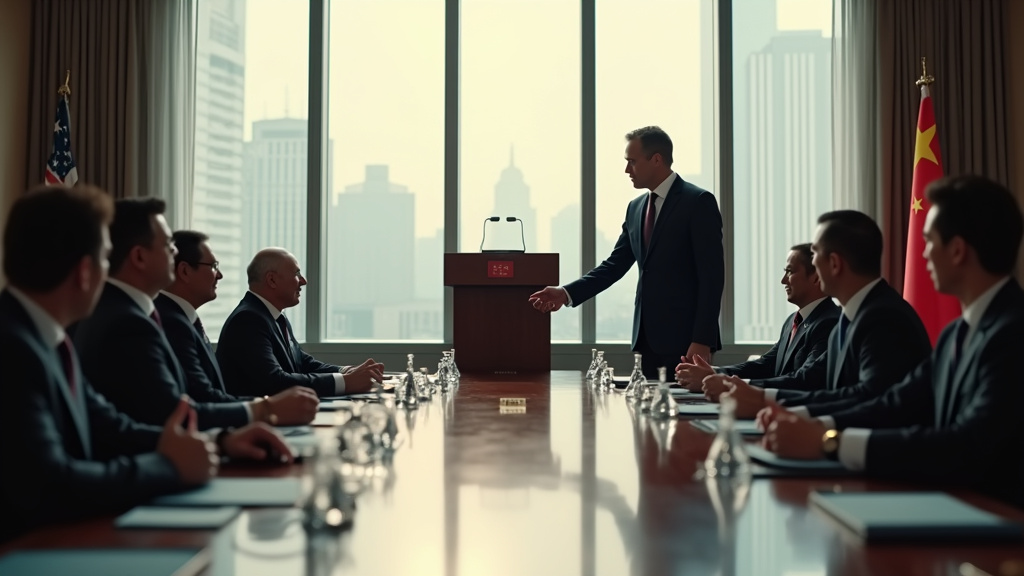The United Kingdom and China are resuming high-level trade discussions after a seven-year pause, signaling a renewed focus on economic engagement between the two global powers. Business Secretary Peter Kyle is leading the charge, arriving in Beijing this week to co-chair the crucial UK-China Joint Economic and Trade Commission (JETCO) talks. This initiative marks the first formal trade dialogue between the nations since 2018 and is a key part of Prime Minister Keir Starmer’s agenda to boost economic growth and enhance Britain’s global competitiveness.
Resumption of Dialogue Amid Shifting Global Dynamics
The JETCO talks, a significant forum for bilateral economic relations, were suspended under the previous Conservative government in 2019 following Beijing’s crackdown on pro-democracy protests in Hong Kong. Years of heightened geopolitical tensions and the COVID-19 pandemic further stalled any high-level engagement. Business Secretary Peter Kyle, who recently took on his role following a cabinet reshuffle, is now tasked with re-establishing this vital channel. His visit to Beijing underscores the current government’s commitment to a more pragmatic, careful, and confident relationship with China, viewing strategic engagement with major economic players as essential for delivering benefits to working people and businesses across the United Kingdom.
Targeting Over £1 Billion in Market Access Wins
A central aim of Kyle’s visit is to secure an ambitious market access package for British businesses, estimated to be worth over £1 billion over the next five years. The proposed package targets key sectors where UK firms see significant export potential. This includes measures to streamline car exports, thereby boosting the automotive industry which directly employs around 133,000 workers in the UK. Additionally, opportunities are being sought for livestock-related exports, such as cattle hides and pig genetics, which would support the diversification and expansion of the UK’s food and drink industry. The education sector is also a focus, with the UK aiming to secure greater recognition for British qualifications and services within the Chinese market. Discussions will also cover professional services and healthcare, areas where UK businesses have demonstrated past success.
Economic Outlook and Export Opportunities
The resumption of trade talks comes at a time when China’s economic importance remains substantial, forecast to contribute 23% of global economic growth between 2023 and 2050. For UK exporters, improved access could unlock significant opportunities within China’s expanding middle-class market. Recent figures highlight the resilience and potential of UK-China trade, with nearly £2 billion in export ‘wins’ supported by the government in the last financial year. These successes span creative industries, retail, and healthcare, with notable deals including the Premier League’s broadcasting agreement with a Chinese streaming platform and a health sciences company’s expansion into the Chinese market. The UK government sees these renewed discussions as a way to put more money into employees’ pockets and drive economic growth.
Navigating Challenges and Geopolitical Complexities
While pursuing economic opportunities, Business Secretary Kyle is also mandated to raise critical challenges in the bilateral relationship. These include concerns about human rights, ‘level playing field’ issues that undermine fair competition for UK business, and other practices that disadvantage British companies. The government’s approach is described as pragmatic, aiming to “cooperate where we can and challenge where we must,” without compromising national security. This delicate balancing act comes amidst a complex global landscape, including ongoing US-China tensions and the lingering impact of previous diplomatic disagreements, such as China’s stance on Russia’s war in Ukraine and historical issues related to Hong Kong.
A Pragmatic Path Forward
The relaunch of the JETCO talks and the broader engagement strategy signal the Labour government’s intent to foster a stable, pragmatic relationship with China, prioritizing national interests while seeking economic benefits. The visit also involves co-chairing the Industrial Cooperation Dialogue, focusing on areas like industrial decarbonisation and the digital economy. As trending global economic news indicates, such high-level engagements are crucial for navigating international trade complexities. While past political headwinds have tested UK-China ties, the enduring commercial relationships underscore the deep-seated nature of these economic links. The success of these renewed trade talks will be measured not only by the immediate market access gains but also by the UK’s ability to foster a balanced and secure economic partnership with one of the world’s largest economies.





